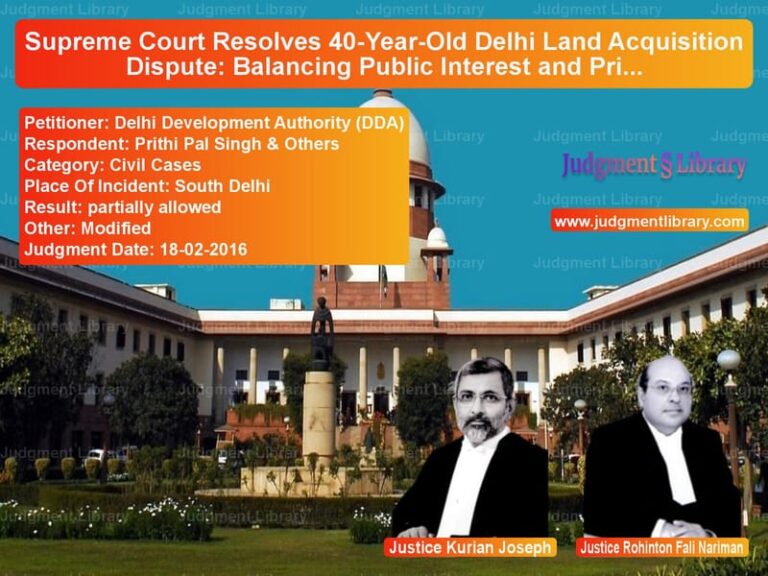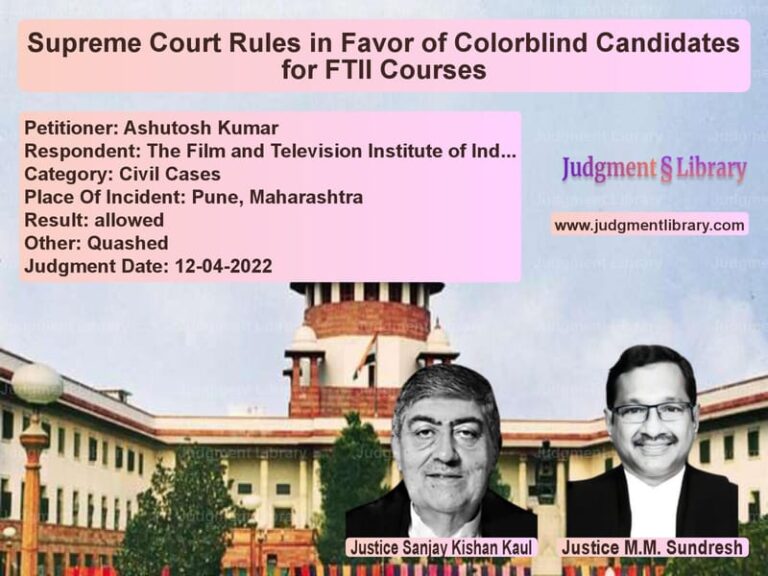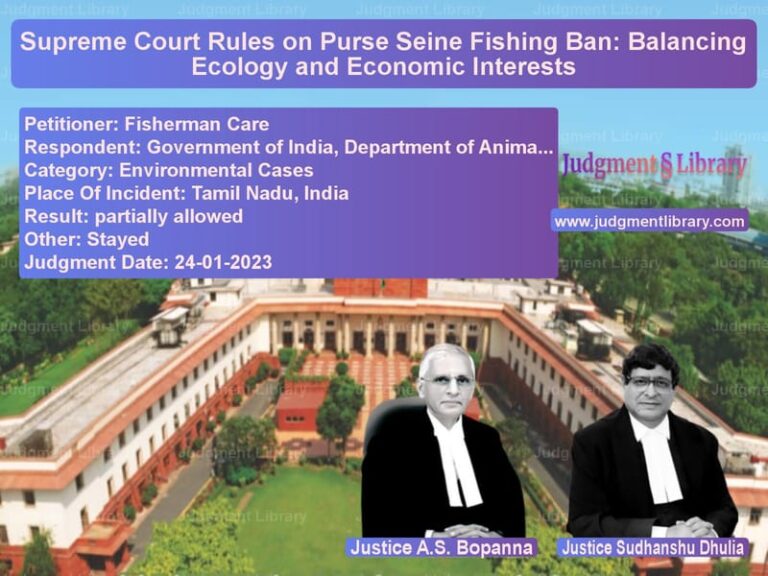Corporate Debt Default and Insolvency: Supreme Court Ruling on SBI vs. Totem Infrastructure
The Supreme Court of India recently delivered a significant judgment in the case of Tottempudi Salalith v. State Bank of India & Ors., which involved corporate debt default, the applicability of limitation in insolvency proceedings, and the rights of financial creditors under the Insolvency and Bankruptcy Code, 2016 (IBC). The ruling clarifies the treatment of recovery certificates issued by Debt Recovery Tribunals (DRTs) and their impact on insolvency proceedings.
Background of the Case
The appellant, Tottempudi Salalith, was the managing director of Totem Infrastructures Limited, a corporate debtor that defaulted on financial obligations to several banks, including:
- State Bank of India
- Union Bank of India
- IDBI Bank
- Oriental Bank of Commerce
- Bank of Baroda
- Karnataka Bank
- Syndicate Bank
- Punjab National Bank
The corporate debtor defaulted on a total debt of Rs. 613.27 crore. Multiple recovery proceedings were initiated before the Debt Recovery Tribunal (DRT), resulting in recovery certificates issued in favor of the banks. These certificates included:
- Recovery certificate issued on September 8, 2015, for Rs. 14.50 crore
- Recovery certificate issued on October 17, 2017, for Rs. 1408.03 crore
- Recovery certificate issued on August 4, 2017, for Rs. 5.22 crore
Based on these recovery certificates, the State Bank of India filed an application under Section 7 of the IBC on September 6, 2019, before the National Company Law Tribunal (NCLT), Hyderabad, seeking initiation of the Corporate Insolvency Resolution Process (CIRP).
Legal Issues Raised
- Whether the application under the IBC was time-barred due to limitation.
- Whether a recovery certificate issued by the DRT constitutes a fresh cause of action.
- Whether the doctrine of election prevents financial creditors from invoking the IBC after pursuing recovery proceedings in the DRT.
- Whether an acknowledgment of debt by the corporate debtor could extend the limitation period.
Arguments by the Appellant (Tottempudi Salalith)
- The corporate debtor had defaulted in 2014, and the application under IBC was filed in 2019, exceeding the limitation period of three years.
- The creditors had already pursued recovery proceedings under the SARFAESI Act and the DRT, and the doctrine of election barred them from initiating insolvency proceedings.
- A letter sent by the corporate debtor on January 29, 2020, requesting a one-time settlement (OTS), could not be treated as an acknowledgment of debt to extend the limitation period.
Arguments by the Respondent (State Bank of India)
- The issuance of a recovery certificate by the DRT creates a fresh cause of action, allowing the financial creditor to file for CIRP within three years of issuance.
- The IBC provides a distinct remedy for corporate resolution, which is different from recovery proceedings under the SARFAESI Act.
- The letter of January 29, 2020, constituted an acknowledgment of debt under Section 18 of the Limitation Act, 1963, extending the limitation period.
Supreme Court’s Observations
The Supreme Court analyzed whether the recovery certificate issued by the DRT could reset the limitation period for filing an application under Section 7 of the IBC. The Court referred to its earlier rulings, including:
- Kotak Mahindra Bank Ltd. v. Kew Precision Parts Pvt. Ltd. – Held that a recovery certificate is a deemed decree.
- Dena Bank v. C. Shivakumar Reddy – Held that issuance of a recovery certificate gives rise to a fresh cause of action.
- Jignesh Shah v. Union of India – Stated that limitation laws apply to IBC proceedings.
Based on these precedents, the Court concluded that the financial creditors were within their rights to initiate CIRP within three years of the issuance of the recovery certificates.
Final Judgment
The Supreme Court upheld the orders of the NCLT and NCLAT, allowing the CIRP to proceed. The Court ruled:
- The limitation period for filing an IBC application resets when a recovery certificate is issued.
- The financial creditor was not barred by the doctrine of election from pursuing CIRP.
- The letter of January 29, 2020, could not extend the limitation period, but since the CIRP application was filed within three years of the 2017 recovery certificates, it was maintainable.
- The financial creditor retains the right to choose the best enforcement mechanism available.
Implications of the Judgment
The judgment has far-reaching implications for financial creditors and corporate debtors:
- Strengthens creditors’ rights – Financial institutions can initiate insolvency proceedings even after obtaining a recovery certificate.
- Ensures faster resolution – Banks and financial institutions can now use CIRP as a viable method for recovering debts.
- Clarifies limitation laws – The ruling establishes that the issuance of a recovery certificate resets the limitation period.
- Prevents corporate debtors from evading insolvency – The decision prevents companies from using technicalities to avoid insolvency proceedings.
The Supreme Court’s decision in this case reinforces the IBC’s role in ensuring that creditors are not left without remedies, while also upholding the sanctity of recovery mechanisms under the SARFAESI Act and the DRT framework.
Petitioner Name: Tottempudi Salalith.Respondent Name: State Bank of India & Ors..Judgment By: Justice Aniruddha Bose, Justice Vikram Nath.Place Of Incident: Hyderabad, India.Judgment Date: 18-10-2023.
Don’t miss out on the full details! Download the complete judgment in PDF format below and gain valuable insights instantly!
Download Judgment: tottempudi-salalith-vs-state-bank-of-india-supreme-court-of-india-judgment-dated-18-10-2023.pdf
Directly Download Judgment: Directly download this Judgment
See all petitions in Bankruptcy and Insolvency
See all petitions in Company Law
See all petitions in Corporate Compliance
See all petitions in Judgment by Aniruddha Bose
See all petitions in Judgment by Vikram Nath
See all petitions in dismissed
See all petitions in supreme court of India judgments October 2023
See all petitions in 2023 judgments
See all posts in Corporate and Commercial Cases Category
See all allowed petitions in Corporate and Commercial Cases Category
See all Dismissed petitions in Corporate and Commercial Cases Category
See all partially allowed petitions in Corporate and Commercial Cases Category







